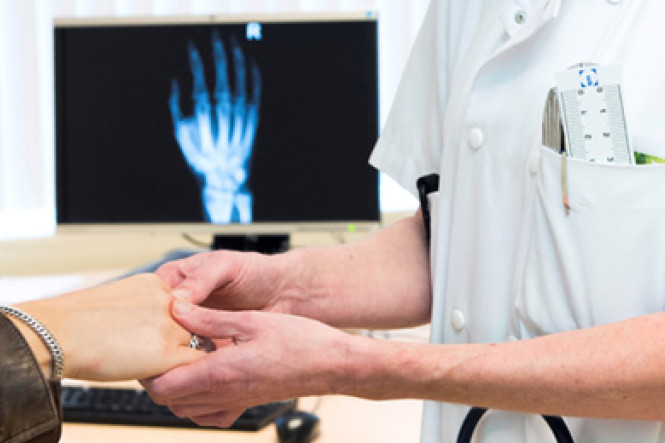Preventing rheumatism? According to researchers at the LUMC, this is definitely not just daydreaming: they are now receiving a 10 million euro Synergy Grant from the European Research Council to further investigate their strategy. It is the first time an umc in the Netherlands has led such a project. The researchers are building on their discovery that patients with rheumatoid arthritis, in the years before they develop symptoms, have sugar-coated antibodies in their blood. "If the factories that make these antibodies are inhibited, we expect that rheumatism can be prevented," says Professor of Rheumatology Tom Huizinga.
Rheumatoid arthritis is chronic inflammation of the joints. It is an autoimmune disease, meaning that the immune system, immune cells and antibodies, turn against the own body. "We have previously found that the antibodies that play a role in rheumatoid arthritis are larger," Huizinga says. "This is due to a sugar group attached to the antibody. We also saw that individuals who produce these sugar-coated antibodies all develop rheumatism later on." In other words, this is a crucial hallmark of rheumatoid arthritis.
Disrupted cells
Not only these antibodies, but also the factories that make them, the B cells, are affected by this extra sugar group. "We see that after a sugar group binds, the B cells become more active and derail a bit," says Professor of Experimental Rheumatology René Toes. With this grant, the researchers want to find out how the sugar group binds to B cells, and thus how these cells get disrupted. "If we know that, we can block the binding of the sugar group to the B cell, and thus treat rheumatism in a targeted way, or even prevent it."
Sounds simple perhaps, but it involves an awful lot of expertise. And not just about the disease itself and the immunology behind it, but also about the function and structure of sugar groups. That is why Professor of Proteomics and Glycomics, Manfred Wuhrer, is closely involved. He has discovered that rheumatoid antibodies are larger using advanced techniques that can identify molecules. "The connection between the clinic, laboratory and engineering is the basis of this project. It is the strength behind our previous successes and it is unique that these areas of expertise can be found under one roof," says Wuhrer.
Delaying rheumatism
LUMC researchers, who previously conducted a study with support from ReumaNederland, wrote this year in The Lancet that rheumatism can be delayed if patients are treated before they get rheumatism. "This gives us hope," says Huizinga. " It provides evidence that we can catch rheumatoid arthritis patients before they develop the disease, which is exactly the group we want to start treating," Huizinga says. "The clinical infrastructure is already in place to test our strategy on patients."
Public disease
Some 270,000 people in the Netherlands suffer from rheumatoid arthritis. The first symptoms often start around the age of 50 and are highly disabling. The pain and stiffness in joints often prevent people from working. "We are getting better at treating rheumatoid arthritis, for example with medication targeting inflammatory hormones," says Toes. "That works well, but is expensive. So if we can prevent rheumatism, we will not only save a lot of suffering, but also a lot of money."
The researchers continuously stress that this is definitely not daydreaming. "We have been working on this for about 20 years, and really think this can work. It's really great that the ERC recognises this too. With this huge grant, we expect to get far," says Huizinga. "To eventually create a targeted therapy for this common disease," concludes Toes.
ReumaNederland
Corné Baatenburg de Jong, deputy director of ReumaNederland: "It's great that our funding opportunities brought this research here and that an ERC could be applied for. On to the next phase. Early diagnosis and early treatment are one of our important themes. People with early-stage (rheumatic) symptoms should get a correct diagnosis and the right care as soon as possible. So that they know where they stand and unnecessary health damage can be prevented. Or even better: so that the disease does not develop and can perhaps even be prevented."
ERC Synergy
The ERC Synergy Grants are for bold scientific challenges, and only pioneering research proposals are considered. The project team, led from the LUMC, consists of four researchers, including Huizinga and Wuhrer, who will receive 2.5 million euros each. The Leiden researchers are collaborating with Salome Pinho from Portugal and Gordan Lauc from Croatia.
